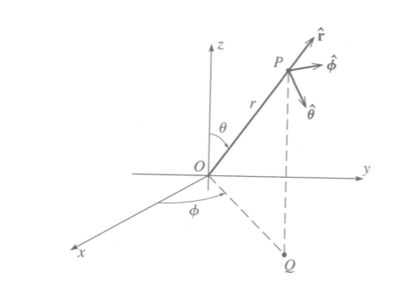Difference between revisions of "Forest UCM Energy CentralForce"
| (4 intermediate revisions by the same user not shown) | |||
| Line 65: | Line 65: | ||
:<math>\vec F = -\vec \nabla U</math> | :<math>\vec F = -\vec \nabla U</math> | ||
| − | ::<math> = \left ( \hat r \frac{d}{dr} + \hat \theta \frac{1}{r} \frac{d}{d \theta} + \hat \phi \frac{1}{ r \sin \theta } \frac{d}{d\phi} \right ) U </math> | + | ::<math> = - \left ( \hat r \frac{d}{dr} + \hat \theta \frac{1}{r} \frac{d}{d \theta} + \hat \phi \frac{1}{ r \sin \theta } \frac{d}{d\phi} \right ) U </math> |
| − | in order to be only a function of r then | + | in order to be only a function of <math>r</math> then |
:<math> \hat \theta \frac{1}{r} \frac{d}{d \theta} U = 0 </math> | :<math> \hat \theta \frac{1}{r} \frac{d}{d \theta} U = 0 </math> | ||
| Line 73: | Line 73: | ||
| + | If <math>\vec F</math> is a conservative central force then <math>\vec F</math> and <math>U</math> are spherically symmetric. | ||
| + | |||
| + | The converse is also true | ||
| + | : if the central force is spherically symmetric then it is a conservative force. | ||
[[Forest_UCM_Energy#Central_Forces]] | [[Forest_UCM_Energy#Central_Forces]] | ||
Latest revision as of 18:38, 27 September 2014
A central force is defined as a force depends only on separation distance
ie
Coulomb force and gravitation force.
Spherical Coordinates
Forest_UCM_NLM_Ch1_CoordSys#Spherical
Gradient in spherical coordinates
The differential change of in spherical coordinates occurs in three directions.
In the radial direction
In the polar angle direction
In the azimuthal angle direction
The differential force of the displacement vector in spherical coordinates is
The derivative may be represented as
in three dimensional cartesian coordinates this may be written in terms of the gradient as
To determine the gradient in sperical coordinates on just compares the two equations
comparing terms of the above with
or
The Central Force
Spherical symmetry
A central force needs to be spherically symmetric in order to be conservative.
If the force is conservative then a potential exists such that
in order to be only a function of then
If is a conservative central force then and are spherically symmetric.
The converse is also true
- if the central force is spherically symmetric then it is a conservative force.
